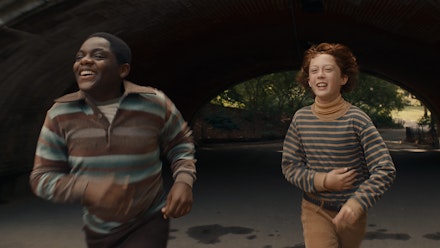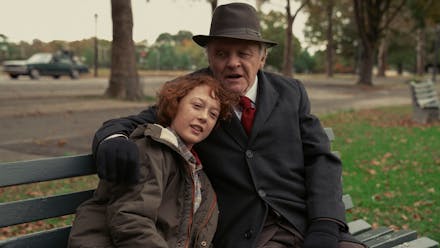“You just want me to be like you,” says 12-year-old Paul Graff (Banks Repeta) in Armageddon Time, unenamoured with his posh new school uniform for the posh new school his parents are making him go to. “No,” says his father (Jeremy Strong), “I want you to be a whole lot better than me. That’s what I want.”
There’s a world of pain there, as there is throughout Armageddon Time, a semi-autobiographical melting-pot that explores much of what made the young James Gray a man. That line – “I want you to be a whole lot better than me” – which mixes a father’s protectiveness with a self-loathing inseparable from his Jewishness, is delivered with heartbreaking humanity from Strong, whose uniquely troubled eyes deliver desperation, insecurity, disappointment. Having gone to space with Ad Astra, Gray is very much back on Earth here, with a film that goes to town on disappointment – in people, in politics, in ourselves. It’s about dealing with it and building from it.

Many of Gray’s films are introspective, interior personal journeys – Two Lovers, The Lost City Of Z and Ad Astra all feel disarmingly intimate. But here he has doubled down, taking a trip into his own childhood with a soulful drama that follows his young avatar, Paul, as he navigates adolescence within that white middle-class Jewish upbringing.
It’s warm but not rose-tinted, sweet but not sentimental.
The Jewish kid befriends a Black kid, and it’s the best of times and the worst of times, as Paul is treated to a succession of wake-up calls, his eyes slowly opening to the reality of the social structure propped up around him. Politics are never far away: Paul’s left-leaning parents, gently aghast at the barely disguised bile coming out of Ronald Reagan’s mouth as he campaigns to be President, are not quite as enlightened as they’d like to think. Gray gets into the cracks, tackling morality, class warfare and racism, but never with too heavy a hand, as Paul begins to see things from different perspectives.
So, it’s warm but not rose-tinted, sweet but not sentimental. At worst it feels slightly contrived towards its conclusion, with things dramatised a little bit more than they maybe needed to be. But still, it’s a means to an end, with the young Paul learning – the hard way – about hypocrisy, injustice and privilege. Never, though, at the expense of the film remaining a touching character study. It’s a plaintive piece of self-reflection – it yearns and aches.

